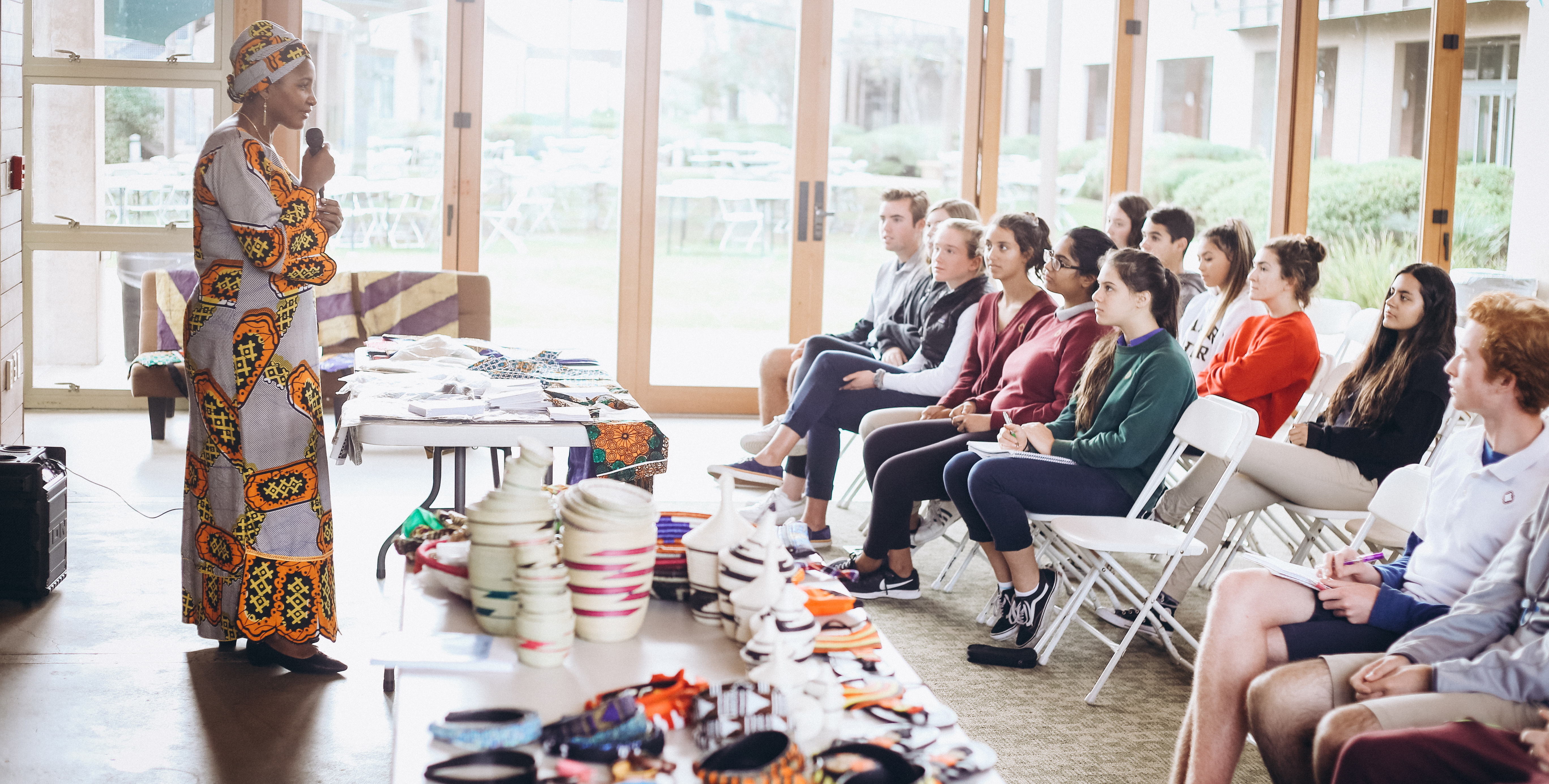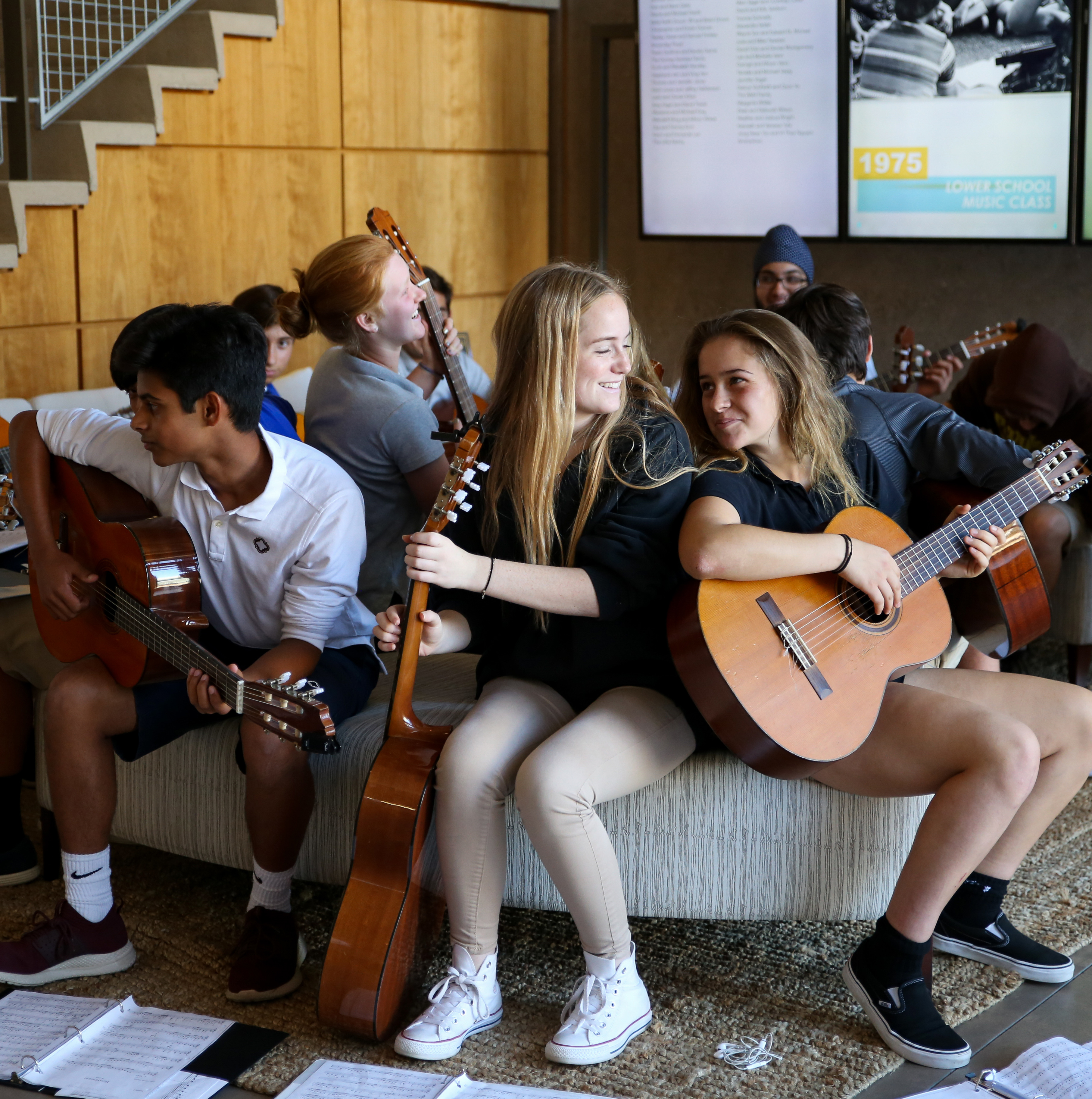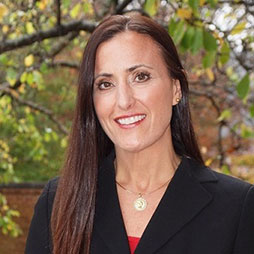



by Head of Upper School Dr. Monica Gillespie
For students to thrive, they need to understand that they have inherent value and worth—they have dignity. Defining oneself is built on the essential understanding that you have self-worth. The Parker community is built upon this same foundation—that everyone at Parker is heard, valued, and respected. The Upper School’s Character Education focus will explore concepts of defining self/identity with special guests and activities throughout the trimester. Marie-Christine Nibagwire visited with Upper Schoolers to share her story of survival and her mission of peace.
April 6, 1994. Marie-Christine tucked her infant daughter into bed, checked on her nieces who were visiting her during a break from school, and tried to reach her sister on the telephone but she didn’t answer. Marie-Christine turned on the television to catch up on the news. The breaking story was an announcement that Juvénal Habyarimana the President of Rwanda was killed when his plane was struck by a surface-to-air missile. She immediately thought of the president’s daughter, whom she knew from boarding school, and felt a great sadness for her. Marie-Christine had no idea what was about to happen.
Soon, there was a knocking at her door. Her family friend burst in and told her that her sister and her children had just been shot and the men were on their way to her house to kill her. Marie-Christine bundled up her daughter on her back and gathered her nieces. But it was too late. Armed men burst into her home and shouted for Marie-Christine and her nieces to line up against the wall. They shot everyone. The bullet intended to kill Marie-Christine missed, but because of her fear, she fell to the ground and she and her daughter fell silent. The men thought they killed them all and left.
Marie-Christine Nibagwire and her daughter survived the Rwandan Genocide of 1994. Her story of courage and strength is painful and inspiring. As a survivor who fought her way to safety, she has dedicated her life to be a refugee advocate and educator founding Safe Refuge Rwanda. Her journey includes speaking with students, and we were honored to host her at Parker last week. Her message to the students was about respecting each other, lifting each other up, resilience, and being an advocate for others. When I spoke with Marie-Christine, I was struck by her profound sense of dignity and thought about how her message for our students went to the heart of our work in character education.
After beginning the year focusing on teamwork in character education, we will be spending this trimester exploring the concept of defining self/identity. Defining self is predicated on the essential understanding that one has inherent value and worth just as creating community is built upon this foundation. In her recent book, “Leading with Dignity,” Dr. Donna Hicks explains the role of dignity in our lives.
“Dignity,” she argues, “not only explains an aspect of what it means to be human but also is a hallmark of our shared humanity. Everyone wants to be treated in a way that shows they matter.” She continues, “Dignity, I argue, is an attribute that we are born with—it is our inherent value and worth,” and clarifies that “Respect is different. Although everyone has dignity, not everyone deserves respect. Respect must be earned. …Dignity is something we all deserve, no matter what we do. …To clear up any confusion, I think it is imperative to respect each other’s dignity.“
She further explains why dignity is so important and how a lack of dignity can cause harm when she writes, “The power behind a violation of our dignity can destroy relationships, breaking the bond of trust that is essential in healthy human connections. And yet when we honor the dignity of others, it creates a sense of safety between us; people feel free to make themselves vulnerable, free to reveal their true selves. Relationships thrive when both parties feel they are seen, heard, and valued.”
Marie-Christine never doubted her dignity even in the harshest times walking across countries, being raped and harmed in many other ways, and holding her daughter who nearly died twice of starvation. She told me that she knew that if they stopped, they would die. And dying was not an option.
As Dr. Hicks writes, “Knowing that our dignity is in our hands, that we are in charge no matter what the circumstances, makes us resilient and able to stay connected to our worthiness.” During adolescence, teenagers are shaping their identities and defining who they are. It is a time of great vulnerability. What gives them strength and the courage to be true to who they are as individuals and to be connected to others in healthy ways is their knowledge that they have their dignity—their inherent value and worth. A common misunderstanding among teenagers (and even some adults) is that dignity is dependent on others or outside of ourselves. Dr. Hicks addresses this false assumption or belief as she states, “One of the major misconceptions about dignity is that we think we gain our sense of worth from external sources.” She continues, “If we mistakenly think our dignity comes only from external sources or from the way others treat us, we are giving up a tremendous amount of internal power—power that gives us resilience, enabling us to ward off assaults and stay firmly grounded in the truth of our worthiness.”
Our students must never question that they have dignity; they must always remember they have inherent value and worth. Always. Not sometimes or only when they do well on a test or in a game or on the stage. Always. No matter what. This what they deserve because, as Dr. Hicks explains, “When people feel that their value and worth are recognized in their relationships, they experience a sense of well-being that enables them to grow and flourish. If, in contrast, their dignity is routinely injured, relationships are experienced as a source of pain and suffering.”
Below for your consideration, please find the “Ten Elements of Dignity” as presented by Dr. Hicks:
“Ten Elements of Dignity”
Acceptance of Identity. Approach people as being neither inferior nor superior to you; give others the freedom to express their authentic selves without fear of being negatively judged; interact without prejudice or bias, accepting that characteristics such as race, religion, gender, class, sexual orientation, age, and disability are at the core of their identities.
Recognition. Validate others for their talents, hard work, thoughtfulness, and help; be generous with praise; give credit to others for their contributions, ideas, and experience.
Acknowledgment. Give people your full attention by listening, hearing, validating, and responding to their concerns and what they have been through.
Inclusion. Make others feel that they belong, at all levels of relationship (family, community, organization, and nation).
Safety. Put people at ease at two levels: physically, so they feel free from the possibility of bodily harm, and psychologically, so they feel free from concern about being shamed or humiliated and free to speak up without retribution.
Fairness. Treat people justly, with equality, and in an even-handed way, according to agreed-on laws and rules.
Independence. Empower people to act on their own behalf so that they feel in control of their lives and experience a sense of hope and possibility.
Understanding. Believe that what others think matters; give them the chance to explain their perspectives and express their points of view; actively listen in order to understand them.
Benefit of the Doubt. Treat people as if they are trustworthy; start with the premise that others have good motives and are acting with integrity.
Accountability. Take responsibility for your actions; apologize if you have violated another person’s dignity; make a commitment to change hurtful behaviors.
Honoring the dignity of those with whom we are in relationships is the glue that binds people together. It’s the way to make people feel safe, valued, and loved. Honoring dignity is love in action.
